5 Mar 2015 | mobile, News and features, United Kingdom
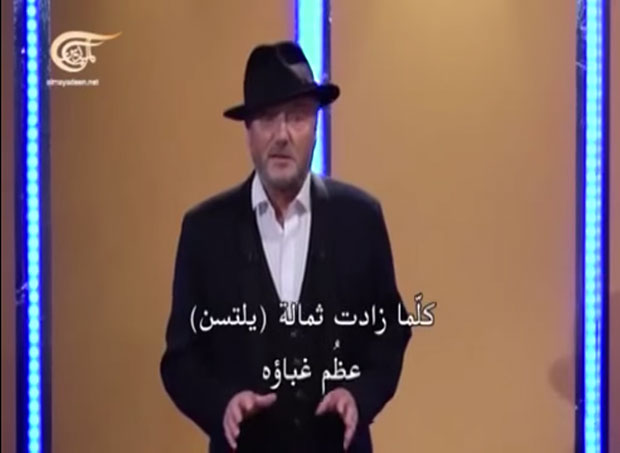
George Galloway’s lawyers have written to Twitter users who retweeted a Hadley Freeman tweet.
TV presenter George Galloway has taken to wearing a black fedora, indoors. I know this, because I have seen him doing so on at least one of his TV shows.
It’s a strange look, somewhere between a puffy Nathan Detroit, though combined with a black suit and white shirt, the hat also evokes Robert Mitchum’s chilling Harry Powell in Night of the Hunter.
Why has George Galloway started wearing a hat indoors? What has taken hold of him? What kind of person wears a hat indoors anyway? The only people who really get away with being pictured in hats, indoors and out, are National Hunt trainers and rabbis. And come to think of it, you rarely see a National Hunt trainer indoors. They’re usually outside, training horses, or watching horse races or being interviewed about how well (or sometimes poorly) their horse did in the race.
I can say with relative certainty that Galloway is not a National Hunt trainer. I am a bit more nervous about declaring whether or not he is a rabbi. Issues between George and some Jewish people being fraught of late, I would not like anyone to think that an assertion of Galloway’s non-rabbiness was a suggestion of anything else.
Galloway has been in the news after his solicitors issued letters demanding apologies from various people who tweeted and retweeted a comment by Guardian columnist Hadley Freeman, who had tweeted about Galloway having “said and done” things she believed “crossed the line” between being “anti-Israel” and “anti-Semitic”.
Galloway tweeted that he would sue. Freeman offered to delete the tweet (and subsequently did). But all in vain: Galloway had made his mind up, telling Freeman “too late”. He also warned others against retweeting Freeman’s original post. Subsequently it has emerged that Galloway’s lawyers are writing to Twitter users demanding not just an apology, but £5000+VAT by varying dates in March to cover the cost of sending the letter.
The solicitors firm, Chambers of Bradford, are not widely known as libel specialists. You would think, given the changes in libel laws in recent years, that one would make sure your lawyers knew what they were doing.
Chambers appear to be focused on immigration, serious crime and fraud and personal injury, among other topics. But above all, they are, according to their own website “calculated risk takers”, who are “not afraid to take on challenges that would daunt many others”.
They boast that their ethos “is to ensure that the ordinary person has access to good quality legal advice as public bodies, insurance companies & multi-national companies which has led us to take on many ‘David & Goliath’ legal struggles for justice”.
This does not seem to tie in with the pursuit of one Twitter user who received a letter from Chambers demanding money. That person, with only 70 followers on Twitter, told the Guardian: “I’m not a politician. I’m not remotely influential. I deleted it. I have been suffering terrible health problems [since receiving the letter]. I’m on antidepressants and suffering from chest pains.”
Chambers’ apparent risk-taking, would seem to have backfired rather spectacularly.
Private Eye magazine said it had “drawn the letter to the attention of the Solicitors Regulation Authority (SRA) which takes a dim view of this sort of ‘speculative invoicing’”.
Meanwhile, lawyers including David Allen Green, Mark Lewis and Mark Stephens, vastly experienced in free speech, libel and privacy, have been offering support to the recipients of the letters. Some lawyers are apparently working with the people behind the “SuedByGalloway” twitter account, which is giving anonymous advice.
Mark Lewis commented “Mr Galloway’s spokesman says that the letters weren’t shown to the client before they were sent. That is a matter of practise and the SRA must investigate”. (McKay has subsequently told Index on Censorship that Mr Galloway had seen the letters, and it was McKay who had not).*
There is a temptation to think what might happen if all these cases — since each tweet is a separate action — did come to court. As with all libel cases, a lot is down to semantics: what exactly does Freeman’s original tweet really mean? Does it mean what Galloway’s solicitors letters’ take it to mean?
And then there is the context of the Defamation Act 2013, which requires that a claimant show that a statement “has caused or is likely to cause serious harm to the reputation of the claimant”.
Moreover, there is the new defence of “honest opinion”, in which a defendant need not prove the absolute truth of the statement (on a topic such as this, how could one do that?) but that he or she sincerely held the view stated as an opinion, and that an honest person “could have held the opinion on the basis of any fact which existed at the time the statement complained of was published”.
It would be genuinely interesting to see if and how a court could draw a line between “staunch anti-Zionism” and anti-Semitism, but in the end, I’m not sure how much use it would be for anyone. Most hate-crime laws already come down to circumstance and perception, just as libel cases, and particularly those involving unprovable abstracts, can only really come down to people’s individual views.
This case is just a manifestation of the usual Galloway bluster. It’s entirely feasible that he was insulted by Freeman’s comment, but his pursuit of her and the people who retweeted her, even after apologies and deletions, is petty and thin-skinned. It is not the behaviour of a gentleman. But then, neither is wearing a hat indoors.
* This article was updated on March 5, 2015, to reflect that Ron McKay told Index on Censorship that Galloway had seen the solicitors’ letters before they were sent
This column was posted on March 5, 2015 at indexoncensorship.org
29 Nov 2013 | Academic Freedom, News and features, United Kingdom
In bid to address the issues surrounding people with extremist views giving talks at British campuses, Universities UK recently released new guidelines on external speakers. “Universities have to balance their obligation to secure free speech with their duties to ensure that the law is observed — which includes promoting good campus relations and maintaining the safety and security of staff, students and visitors,” says the body, which represents vice-chancellors.
This is not the first time they have spoken out about the topic. However, a set of guidelines from 2011 reads: “It is the law alone which can set restrictions on freedom of speech and expression and on academic freedom — it is for the law and not for institutions or individuals within institutions to set the boundaries on the legitimate exercise of those rights”. It appears they are calling for somewhat stricter regulation this time around. The current guidelines are also more in line with the view of the National Union of Students, which maintains that “(…) many students’ unions may wish to go further than the law on securing ‘freedom from harm’ when restricting some speaker activity.” The NUS’ own “No Platform” policy, banning certain speakers from their events, puts this theory into practice.
This is one of those topics that seems to come up at fairly regular intervals, and the outline of the debate is familiar by now. One side argues that speakers with outwardly hateful or discriminatory views don’t deserve a platform through which to legitimate them; while the other side argues that to deny them this is to deny them the right to freedom of expression, which also extends to those with whom we disagree. The following speakers have been responsible for at one point reigniting the debate, each in their own way.
1) Nick Griffin
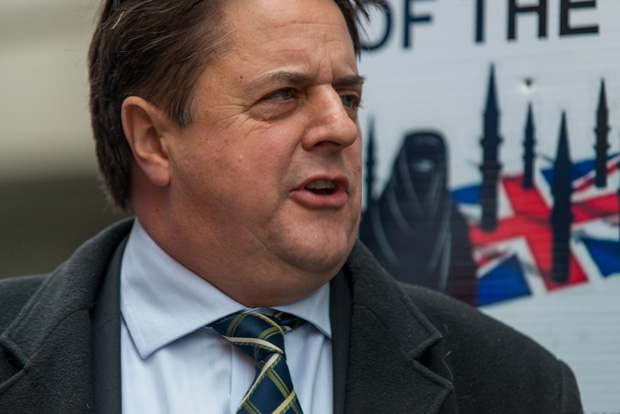
Nick Griffin outside the Old Bailey court on the first day of the trial of the murder of Lee Rigby (Image: Velar Grant/Demotix)
The most famous case in recent years was the 2007 appearance of BNP leader Nick Griffin (and Holocaust-denying historian David Irving) at an Oxford Union debate on free speech. The invitation caused massive uproar, with protesters picketing the event. “It is not just an Oxford issue, this will have ramifications for other places where the BNP are active… this is going to give legitimacy and credibility to their views,” said Student Union President Martin McClusky at the time. “I find the views of the BNP and David Irving awful and abhorrent but my members agreed that the best way to beat extremism is through debate,” argued Oxford Union president Luke Tryl. This is not only time the Nick Griffin has caused controversy as a potential university speaker. Trinity College Dublin cancelled plans to include him in a debate immigration, saying “it could not guarantee the safety and wellbeing of staff and students”.
2) Mufti Ismail Menk
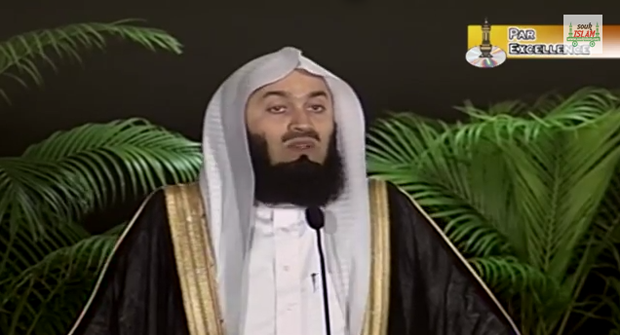
Mufti Ismail Menk giving a lecture (Image: soukISLAM/YouTube)
Islamic preacher Mufti Ismail Menk spoke at Liverpool University earlier this month. He has previously stated that gay people are “filthy” and “worse than animals”. The event was initially reported to be part of a longer tour stopping at Glasgow, Leeds, Liverpool, Leicester, Cardiff and Oxford universities. However, all except Liverpool, where he was hosted by the Islamic Society, revoked their invitation or said he had not been officially invited in the first place. Liverpool responded that it is “not the role of the university to censor people’s views”.
3) Mohamed El-Nabawy
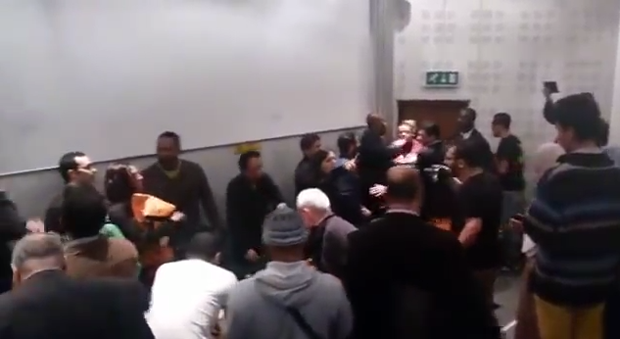
A video captured the protest that erupted when Mohamed El-Nabawy was due to speak at SOAS (Image: YouTube)
A representative of Tamaroud, the grassroots movement which played a significant role in the ousting of Egypt’s Muslim Brotherhood-backed elected government, was chased away by angry protesters prior to a scheduled talk at London’s School of Oriental and African Studies (SOAS). The protesters, who were not students, chanted and brandished posters associated with the Muslim Brotherhood at the open lecture. SOAS security had to escort El-Nabawy off campus using an emergency exit . A spokeswoman for the Palestinian Society, which had organised the talk, said: “In the pursuit of freedom of speech and expression, some people may find some of the views expressed at our events objectionable.”
4) David Gale
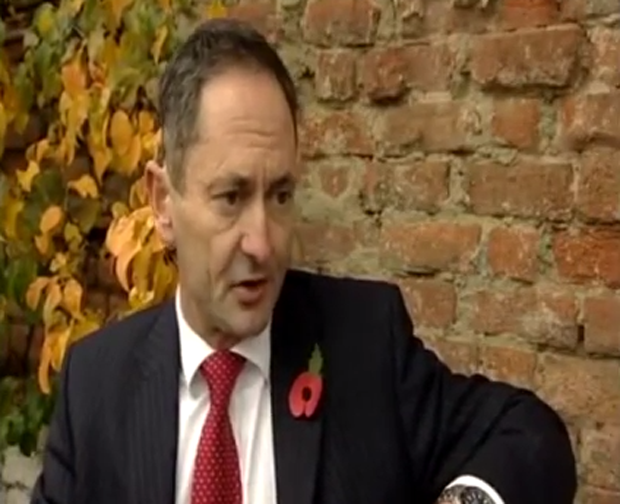
David Gale on the BBC’s Sunday Politics Show (Image: UKIPDerby/YouTube)
In 2012 the Student Union at the University of Derby banned David Gale, UKIP’s candidate for Police and Crime Commissioner, from taking part in a Q&A session at the university. The Union has a no platform policy for “individual(s) who they believe to be a member of a group with racist, fascist or extremist views”, a category the Union believed was applicable to UKIP . UKIP leader Nigel Farage weighed in on the issue at the time, saying: “It is frightening that a Derby student body is so frightened of free speech and public opinion.”
5) George Galloway
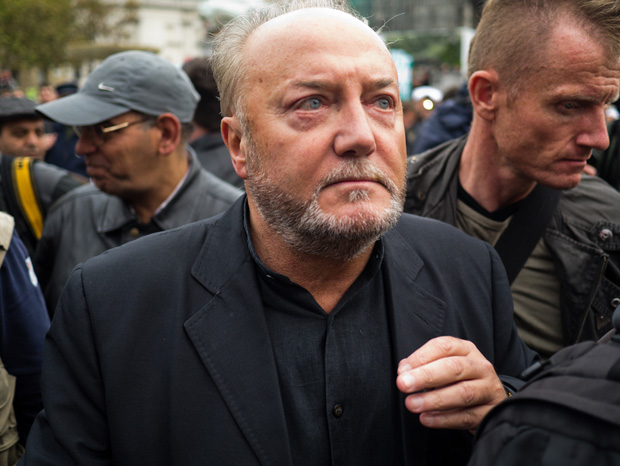
George Galloway attends an anti-war rally in 2011 (Image: Paul Soso/Demotix)
In March, George Galloway was set to speak at an event organised by the University of Chester Debating Society. However, the invitation was revoked by the Student Union, acting in line with the NUS’ No Platform policy on Galloway. This move came after the Respect Party MP was involved in a string of controversial incidents, including refusing to debate with an Israeli student at an Oxford University panel discussion. Galloway’s camp have called the policy “idiotic, anti-democratic and politically-motivated”.
6) Julie Bindel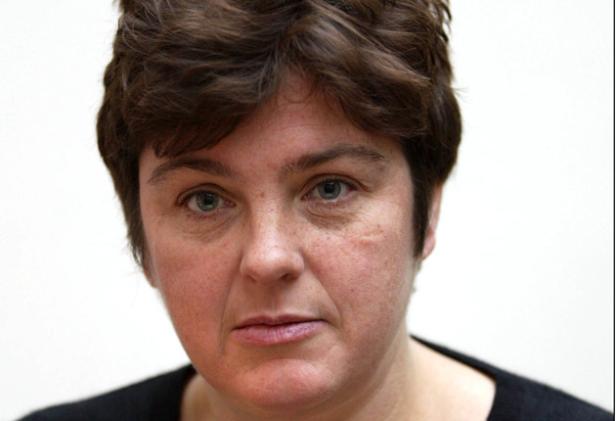
In September, the Debating Union at Manchester University (MDU) invited feminist writer and campaigner Julie Bindel to speak at their discussion on pornography. A number of people objected due to Bindel’s reported views about transexual people, which have led to the NUS implementing a No Platform policy for her. Some transexual students and their supporters “felt Julie Bindel’s transphobic statements and views made them both unwelcome at the event, and unsafe on campus, as it seemed that transphobia was being allowed and possibly encouraged,” said Loz Webb, the university’s Trans* representative. Despite this, MDU refused to replace Bindel, though she eventually chose to drop out after receiving death threats.
This article was originally posted on 29 Nov 2013 at indexoncensorship.org
9 Jan 2013 | Uncategorized
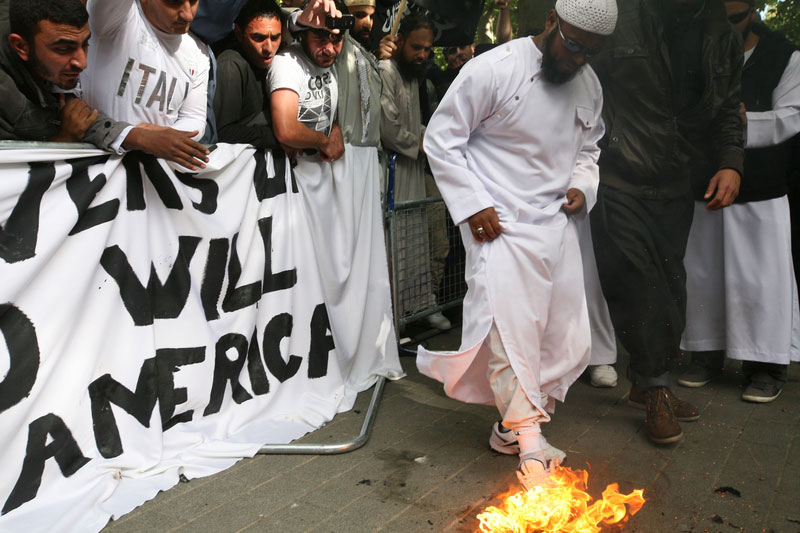 Protests against The Innocence of Muslims at the US Embassy in London (Demotix)
Protests against The Innocence of Muslims at the US Embassy in London (Demotix)
This one sneaked under the radar before Christmas. On 6 December, UK parliamentarian Alex Cunningham, the Labour MP for Stockton North, tabled an “Early Day Motion” demanding that the British government ban the controversial anti-Islam film “The Innocence of Muslims”. The moved was backed by 14 other MPs — 11 Labour, two Liberal Democrats, and RESPECT’s George Galloway.
Here’s the text of the EDM in full:
That this House notes the anger of Muslim constituents in response to the online video, The Innocence of Muslims; is offended by the vile, Islamophobic slurs it makes about a faith followed by over two billion people worldwide; believes that the film constitutes incitement to hatred on the grounds of race and religion; further believes that the film itself is of appallingly poor quality; and urges the Government tomake provision for its banning.
Note the invocation of our friend Muslim anger; note the absurd generalisation of the feelings of “two billion people worldwide” — none of the 15 signatories is actually Muslim. Note the remark on the “poor quality” of the film, a classic censor’s gambit (“it’s rubbish anyway, so this doesn’t really count as censorship”), but one which also raises the question of whether they’d call for Innocence of Muslims to be banned if it was well made. All rather grim.
The signatories are listed below (source http://www.edms.org.uk). Is your MP part of this censorious set?
Alex Cunningham Stockton North (Labour)
Iain Wright Hartlepool (Labour)
Simon Danczuk Rochdale (Labour)
Ian Lavery Wansbeck (Labour)
Jim Dobbin Heywood and Middleton (Labour)
Andy McDonald Middlesborough, Labour
Ronnie Campbell Blyth Valley (Labour)
Sandra Osborne Ayr, Carrick and Cumnock (Labour)
Kelvin Hopkins Luton North (Labour)
Alan Meale Mansfield (Labour)
George Galloway Bradford West (Respect)
Andrew George St Ives (Liberal Democrat)
Mike Hancock Portsmouth South (Liberal Democrat)
Roger Godsiff Birmingham, Hall Green (Labour)
Mary Glindon North Tyneside (Labour)
Read more on The Innocence of Muslims:
A new argument for censorship? Padraig Reidy asks if this time is different from previous blasphemy rows








